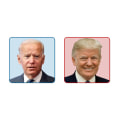As the 2020 election in New York approaches, the airwaves and social media feeds are filled with political advertisements. These ads are a crucial part of any campaign, as they allow candidates to reach a wide audience and convey their message to potential voters. However, with the rise of digital advertising and the increasing influence of money in politics, there have been growing concerns about the impact of political ads on elections.
The Power of Political Advertising in Elections
Political advertising has been a part of American elections since the early days of the republic. In fact, the first political ad was published in a newspaper in 1796, promoting John Adams for president.Since then, political advertising has evolved significantly, from print ads to radio and television commercials, and now to digital ads on social media platforms. The purpose of political advertising is to persuade voters to support a particular candidate or issue. These ads can take various forms, from positive messages highlighting a candidate's accomplishments to negative attack ads targeting their opponent. They can also include endorsements from prominent figures or testimonials from everyday citizens. Political advertising is a powerful tool for candidates, as it allows them to reach a large audience quickly and effectively. It also plays a significant role in shaping public opinion and influencing voter behavior.
However, with this power comes responsibility, and that's where restrictions on political advertising come into play.
The Legal Framework for Political Advertising in New York
In the United States, political advertising is protected under the First Amendment of the Constitution, which guarantees freedom of speech. However, this does not mean that there are no restrictions on political advertising. In fact, there are several laws and regulations that govern how and when political ads can be used. In New York, the main law regulating political advertising is the New York Election Law. This law sets out the rules for campaign finance, including how much money candidates can spend on their campaigns and where that money can come from.It also includes provisions for political advertising, such as disclosure requirements and restrictions on certain types of ads. One of the most significant restrictions on political advertising in New York is the ban on corporate contributions. This means that corporations, including businesses and unions, are not allowed to donate money to political campaigns or purchase ads in support of a candidate. This restriction aims to prevent wealthy corporations from having an undue influence on elections. Another important restriction is the requirement for disclaimers on political ads. According to the New York Election Law, all political ads must include a disclaimer stating who paid for the ad and whether it was authorized by a candidate or campaign committee.
This helps voters identify who is behind the ad and prevents anonymous or misleading ads.
Restrictions on Digital Political Advertising
In recent years, there has been a significant shift towards digital advertising in political campaigns. With the rise of social media platforms like Facebook and Twitter, candidates can now reach a vast audience at a fraction of the cost of traditional media. However, this has also raised concerns about the lack of transparency and accountability in digital political advertising. In response to these concerns, New York passed the Honest Ads Act in 2019, which requires online platforms to maintain a public database of all political ads purchased on their platform. This database includes information about who paid for the ad, how much was spent, and who the ad targeted.This law aims to increase transparency and prevent foreign interference in elections. Additionally, New York has also implemented restrictions on microtargeting in digital political ads. Microtargeting is a technique used by advertisers to target specific groups of people based on their interests, demographics, and online behavior. While this can be an effective way to reach potential voters, it has also been criticized for its potential to spread misinformation and manipulate voters.
The Impact of Political Advertising Restrictions
While restrictions on political advertising aim to promote transparency and fairness in elections, they also have some unintended consequences. For example, the ban on corporate contributions has led to the rise of Super PACs, which can raise unlimited funds from individuals and spend them on political ads.This has resulted in an increase in negative attack ads and a lack of accountability for the content of these ads. Moreover, the restrictions on digital political advertising have raised concerns about censorship and the impact on free speech. Some argue that these restrictions limit the ability of candidates to reach voters and stifle political discourse. On the other hand, proponents argue that these restrictions are necessary to prevent the spread of false information and protect the integrity of elections.
In Conclusion
Political advertising is a crucial part of any election, but it is not without its limitations. In New York, there are several restrictions in place to promote transparency and fairness in political campaigns.These include bans on corporate contributions, requirements for disclaimers on ads, and regulations on digital advertising. While these restrictions have their benefits, they also have unintended consequences that must be carefully considered. As we approach the 2020 election in New York, it is essential to understand these restrictions and their impact on our democracy.



